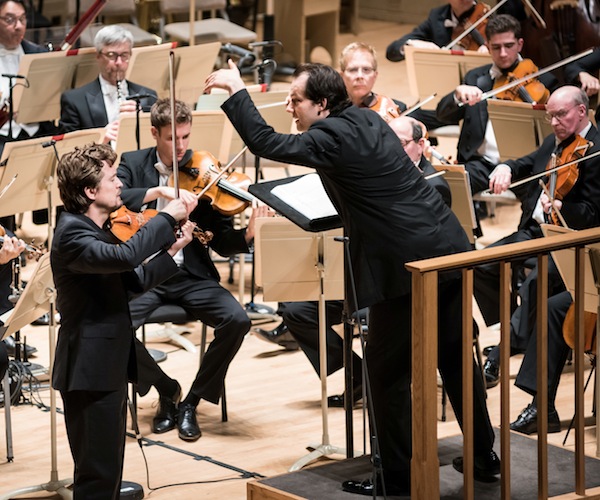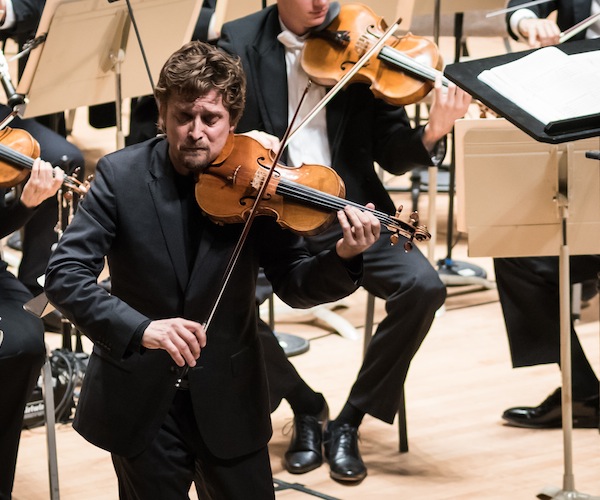Concert Review: Violinist Christian Tetzlaff, Andris Nelsons, and the BSO — Electrifying
Saturday’s was the most electrifying, exciting, spontaneous-sounding, inevitable performance of this warhorse (Beethoven’s Violin Concerto) I’ve heard.

Christian Tetzlaff with the BSO and music director Andris Nelsons. Photo: Liza Voll.
By Jonathan Blumhofer
“There was more [of soloist Christian] Tetzlaff in that performance than there was of Beethoven.” So commented a patron in my vicinity during intermission on Saturday night at Symphony Hall, following the said violinist’s account of Beethoven’s Violin Concerto with Andris Nelsons and the Boston Symphony Orchestra (BSO).
Was my neighbor referring to the notes? Probably not: they were all (as best I could tell) the ones Beethoven put in the score. True, Tetzlaff crafted his own cadenza to the first movement (modeled on Beethoven’s controversial 1807 arrangement of the piece for piano) and he possibly added some improvisatory flourishes in the second and third movement cadenzas, too (the program notes didn’t divulge either way). But the non-cadenza pitch content in Tetzlaff’s performance was, by and large, accurate.
If the notes were (mostly) all Beethoven’s, that left Tetzlaff’s interpretation. Here, to be fair, things weren’t exactly kosher. The violinist tended towards extremes of dynamics, articulation, rhythm, and color. There was lots of soft, inward playing, the type that sets you on the edge of your seat to make sure you don’t miss anything. Rhythm was flexible – held back here, rushed ahead there – and Tetzlaff wasn’t averse to placing a special accent at the beginning of this phrase or that.
But it all served a purpose: Saturday’s was the most electrifying, exciting, spontaneous-sounding, inevitable performance of this warhorse I’ve heard. It captured, to my imagination at least, some sense of the thrilling quality that must have greeted this music when it was new. I might not have agreed with every interpretive decision, but there was not one boring phrase in Saturday’s performance. On the contrary, Tetzlaff’s reading was the equivalent of dissecting this familiar music, taking out its individual parts, holding them up to a light and examining them from different angles one at a time, and then putting everything back together.
Was there more Tetzlaff in it than Beethoven? One of the primary jobs of an interpreter is to make the music speak, and it will necessarily speak differently to audiences in the 21st century than it did to audiences in the 20th or 19th. Tetzlaff’s interpretation spoke loudly to me but I never got the sense, as my neighbor did, that it was really about the soloist. Quite the contrary: this seemed to me to be mainly about Beethoven speaking to a contemporary audience through Tetzlaff’s fiddle. The moral? To each, his (or her) own, I suppose.
In fact, for my money, Tetzlaff’s was as truly Beethovenian a performance as they come. It was unsettling, fresh, quirky, and provocative. From the expansive forcefulness and improvisatory sweetness of the opening movement to the haunting stasis of the second and the bounding rhythms of the finale, Saturday’s was a reading that never flagged in energy or concentration. It kept me hooked for all of its forty-five minutes, which is more than I can say of most performances I’ve heard of the piece over the last twenty-odd years.
Nelsons did his part to enliven the proceedings, eliciting a rich, robust accompaniment from the BSO. The Violin Concerto is a familiar piece for the orchestra – counting Tanglewood, this was the thirteenth BSO program on which it has turned up since 2002 – but the orchestra illuminated its structure on Saturday with uncommon vigor and color. Tetzlaff, who this weekend cemented his reputation as one of the most probing, stylish, and energetic soloists on the circuit today, delivered a graceful account of the finale of Bach’s C major Violin Sonata as an encore.
Nelsons and the BSO were also fully in their element on the program’s other pieces, both by Dmitri Shostakovich. They brought a searing, emotional intensity to the Tenth Symphony, which closed Saturday’s concert, and a blistering heat to the Passacaglia from Act 2 of Lady Macbeth of Mtsensk, which opened it. Textural clarity – even at maximum volume – was the order of the day in both works.
As in the Beethoven, it was fascinating to track the Symphony’s dramatic arc: from the huge, slowly unfolding opening movement to the ferocious scherzo to the songful third movement and ambiguously triumphant finale, the BSO never overplayed its hand, expressively. Nelsons layered the music’s busy counterpoint – and Shostakovich was nothing if not a manic contrapuntalist – with remarkable transparency. Concertmaster Malcolm Lowe, principal horn James Somerville, principal flute Elizabeth Rowe, principal oboe John Ferrillo, and timpanist Timothy Genis were among the orchestra’s standout soloists.

Christian Tetzlaff with the BSO and Andris Nelsons. Photo: Liza Voll.
The Passacaglia kicks off with a furious, dissonant scream before settling down, building to an anguished climax, and finally dissipating. It’s a crusty ten-minute score whose inclusion on these concerts was a stroke of programming wisdom that, with the Symphony no. 10, neatly bookend Tetzlaff’s singular account of the Beethoven.
Last week’s big news was that Nelsons and the BSO are embarking on a Shostakovich cycle to be recorded and distributed by Deutsche Grammophon. This weekend’s Shostakovich selections are to comprise the first album, to be released this summer. Saturday’s performance suggests that this might turn into one of the BSO’s landmark recording projects. Let’s hope it does.
At any rate, the timing for it seems good: Saturday’s was the strongest performance I’ve yet heard from Nelsons and the BSO. There were no weak links, technically, musically, or interpretively. Program-wise, everything clicked. All three pieces conveyed a timely urgency. The experience of hearing the concert was an event. That’s exactly how it should be.
Jonathan Blumhofer is a composer and violist who has been active in the greater Boston area since 2004. His music has received numerous awards and been performed by various ensembles, including the American Composers Orchestra, Kiev Philharmonic, Camerata Chicago, Xanthos Ensemble, and Juventas New Music Group. Since receiving his doctorate from Boston University in 2010, Jon has taught at Clark University, Worcester Polytechnic Institute, and online for the University of Phoenix, in addition to writing music criticism for the Worcester Telegram & Gazette.
Tagged: Andris Nelsons, Boston Symphony Orchestra
